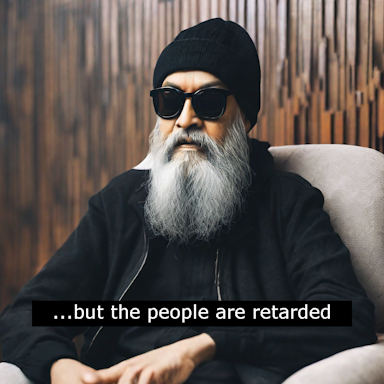"A creative man is motivated by the desire to achieve, not by the desire to beat others."— Ayn Rand
Within the complex landscape of economic ideologies, laissez-faire stands as a champion of minimal government intervention, individual freedom, and free markets. As we navigate the intricate corridors of strict individualism within laissez-faire, we find echoes of concerns raised by Alexis de Tocqueville. Despite the temporal separation – with Tocqueville predating Ayn Rand by a decade – their perspectives on individualism shape our discourse. In this exploration, we delve into the interplay between laissez-faire, Tocqueville's reservations about unchecked individualism, and the unapologetic individualism espoused by Ayn Rand's Objectivism. Moreover, we unveil the isonomic model—a concept integrating participatory governance and decentralized decision-making—as a potent bridge that addresses and refutes Tocqueville's concerns.
Isonomics is developing Nomics, a dApp for decentralized elections, utilized by its $Nomos token. Launched on January 21, 2024, at $0.000000012 or $12 per billion tokens, it's now trading at $29 per billion with a market cap of $22,538.
Understanding Laissez-Faire:
Derived from the French phrase "let it be," laissez-faire champions limited government intervention in economic affairs. It extols the virtues of the free market as the optimal means for resource allocation and economic growth, emphasizing private property rights, voluntary association, competition, and minimal regulation. Advocates argue that this hands-off approach empowers individuals to pursue self-interests, ultimately benefiting society at large.
Tocqueville's Concerns about Unchecked Individualism:
Alexis de Tocqueville, a luminary political thinker of the early 19th century, raised a cautionary flag against the potential pitfalls of unbridled individualism. While early American democracy thrived in communities with shared values and social ties, Tocqueville warned that an unfettered pursuit of self-interest could erode these foundations. Declining membership in voluntary associations, a surge in self-interest, a weakening of trust, and escalating polarization were among the risks he identified.
The Essence of Ayn Rand's Objectivism:
Ayn Rand's Objectivism boldly asserts unapologetic individualism, fervently advocating for rational self-interest, personal achievement, and the principles of laissez-faire capitalism. At the core of Rand's philosophy lies a profound emphasis on the moral virtues of reason, individual rights, and the transformative power of free-market capitalism. According to Rand, rational self-interest is not only ethically permissible but is, in fact, a moral good that propels innovation, fuels personal achievement, and catalyzes societal progress.
In the realm of Objectivism, altruism is resolutely rejected in favor of a philosophy that places paramount importance on individual happiness and flourishing. Rand's vision posits that the pursuit of one's rational self-interest not only serves personal fulfillment but contributes inherently to the greater good of society. Despite the temporal gap, Rand's insistence on rationality and individual achievement resonates deeply with the laissez-faire ethos. However, it's acknowledged that this unyielding individualism may present challenges in reconciling with Tocqueville's concerns about societal cohesion.
Navigating the Perceived Challenges:
Critically examining how the isonomic model offers a bridge becomes imperative. This model aligns with principles appreciated by Ayn Rand, such as voluntary association and jurisdictional competition, but it goes further. The isonomic model explicitly recognizes private property rights as fundamental, limits economic regulations, and minimizes corporate and income taxes. It seamlessly integrates Tocqueville's advice on revitalizing voluntary associations, actively promoting regional self-rule, and respecting diverse viewpoints.
Sparked by isonomics? Dive into our Discord channel to join dynamic discussions, share your insights, and play a role in shaping the future of decentralized governance and civic engagement. Your voice holds significance—be a catalyst for change today!
Refuting Tocqueville's Concerns:
The isonomic model serves as a robust response to Tocqueville's concerns about individualism. By encouraging regional self-rule, it revitalizes voluntary associations—the very fabric of civic participation that Tocqueville saw as essential. Through decentralized decision-making, the model prevents the concentration of power and promotes consensus-based leadership, directly aligning with Tocqueville's vision of balanced governance. The functional overlapping and competing jurisdictions (FOCJs) ensure that no single entity wields disproportionate power, addressing Tocqueville's apprehensions about the unchecked pursuit of self-interest.
Acknowledging Tocqueville's Warning and Presenting Solutions:
In acknowledging the manifestation of some of Tocqueville's concerns in modern societies, the blog post presents a balanced view. It recognizes both the validity of Tocqueville's concerns and the resolute solutions offered by the isonomic model and Objectivism. By refuting concerns through practical application, the isonomic model becomes a tangible manifestation of a balanced society where individual autonomy coexists harmoniously with community cohesion.
Conclusion:
In the pursuit of harmonizing individualism, the blog post navigates the intricate terrain of laissez-faire, Tocqueville's cautions, and Ayn Rand's Objectivism. Despite the temporal separation, their perspectives on individualism remain pivotal in shaping the discourse. By critically exploring the isonomic model as a potent bridge, we envision a future where individual freedom coexists seamlessly with collective cohesion. Drawing from these diverse perspectives, let us collectively forge a society that integrates the principles of laissez-faire, addresses Tocqueville's concerns, and harmonizes the essence of individualism in Ayn Rand's Objectivism.
Excited to endorse this article or proudly showcase your early discovery of isonomics? Utilize the Sushi Cross-chain Swap to convert Ethereum to Base and mint the article.
Collect this post as an NFT.

